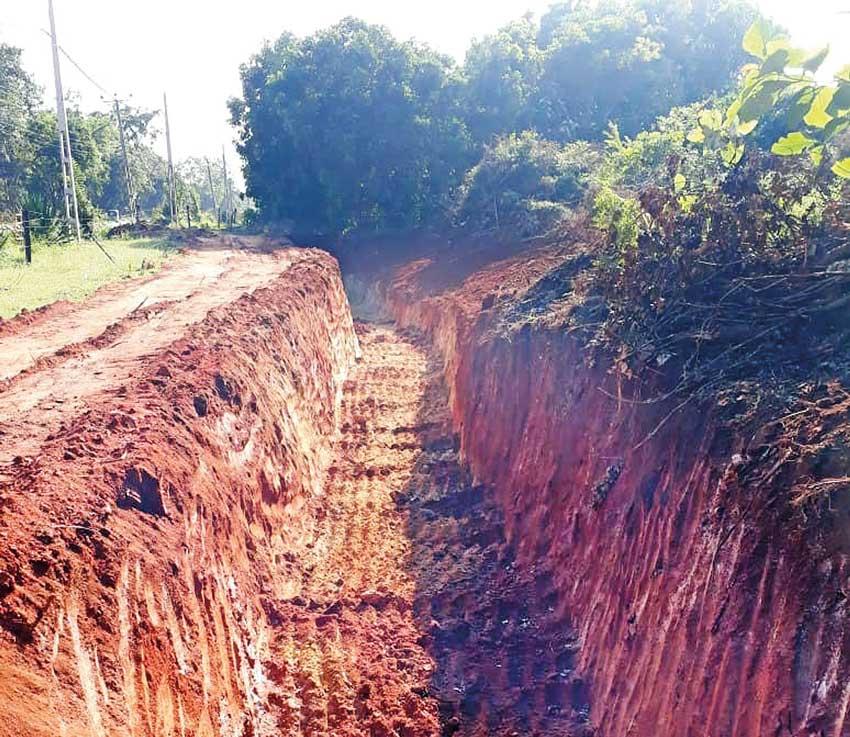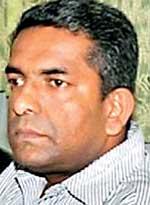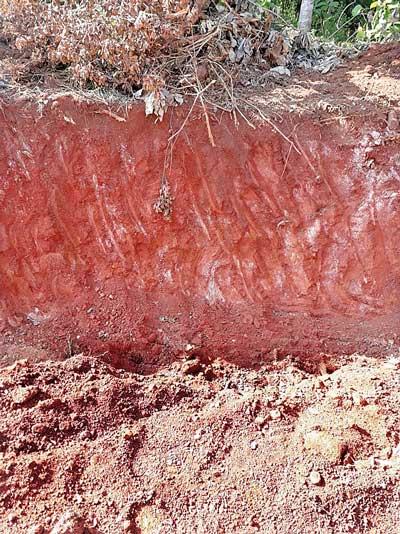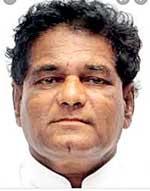06 Jan 2022 - {{hitsCtrl.values.hits}}

No environmental impact assessment had been conducted regarding these trenches
 Authorities are yet to find a permanent solution to the Human-Elephant Conflict (HEC) and wild elephant raids. Some people who were assigned with the task to find solutions suggested to name wild elephants as forest elephants. Some stole the moneys allocated to build electric fences. Yet the HEC remains unsolved.
Authorities are yet to find a permanent solution to the Human-Elephant Conflict (HEC) and wild elephant raids. Some people who were assigned with the task to find solutions suggested to name wild elephants as forest elephants. Some stole the moneys allocated to build electric fences. Yet the HEC remains unsolved.
Solutions were proposed from time to time; some of which had to be carried out incurring enormous expenses. People who earned profits through these projects often introduced new projects to earn more profits. Yet the HEC wasn’t addressed. It was reported recently that the Director-General of the Department of Wildlife Conservation (DWC) Chandana Sooriyabandara had initiated a new project to address the HEC. That project involved building alternative barriers next to elephant fences in areas which witnessed the HEC in abundance. The DWC affirmed that measures had been taken to build alternative barriers after conducting a detailed study on the HECs.
Excavating trenches and building hanging electric fences in addition to electric fences were such alternatives. The DWC Director-General had informed the media that such alternative barriers could prevent elephants from entering villages. Building alternative barriers has already commenced. According to DWC data the length of a current electric fence is 4500 kilometres and building another fence spanning 1500 kilometres is scheduled for next year.
Digging trenches has already commenced in selected protected areas. The Fauna and Flora Ordinance clearly states the manner in which a development activity should be carried out in any protected area. An organised racket has been reported recently where trenches are dug illegally and soil is being sold flouting the Fauna and Flora Ordinance.

Every officer is transferred after two years and transfers are authorised through the transfer committee. If they had opposed digging trenches, disciplinary actions would have been taken following a disciplinary inquiry. If the department finds that trenches cause no issues, we grant permission. The EIA is not required
- Chandana Sooriyabandara DWC Director-General
Its first stage can be witnessed in the Udawalawa Reserve. A huge trench was seen in the reserve boundaries recently. This trench is being built alongside Thanamalwila Road close to the Udawalawa National Park. DWC officers said that despite these trenches preventing elephant raids into villages, it provided only a temporary solution. Even though the Z-D canal and other canals were built and filled with water to mitigate elephant raids, wild elephants in the Maduru Oya reserve still enter villages. DWC officers said digging trenches was not a long term or permanent solution for the HEC.
Only the contractors excavating trenches receive long-term benefits as cleaning trenches and removing soil are to be continued for a long time. A reserve is operated in keeping with the specifications in the Fauna and Flora Ordinance. The ordinance declares wildlife protected areas and protects both flora and fauna in such areas and selected flora and fauna within two miles radius outside the boundary of any reserve. The ordinance clearly states the content protected by the Flora and Fauna Ordinance.
 There are two types of wildlife protected areas; national reserves and sanctuaries. National reserves are divided in to five more categories. No development activity can be carried out within one mile radius from the reserve boundaries because they are termed illegal. If such an activity is to be conducted an Environmental Impact Assessment (EIA) report should be obtained. The ordinance does not allow any development activity to be carried out without the EIA report. No development activity can be carried out in any area outside two miles radius from a national reserve. Any development activity in a sanctuary boundary should be carried out under the National Environmental Act after obtaining and an EIA Report.
There are two types of wildlife protected areas; national reserves and sanctuaries. National reserves are divided in to five more categories. No development activity can be carried out within one mile radius from the reserve boundaries because they are termed illegal. If such an activity is to be conducted an Environmental Impact Assessment (EIA) report should be obtained. The ordinance does not allow any development activity to be carried out without the EIA report. No development activity can be carried out in any area outside two miles radius from a national reserve. Any development activity in a sanctuary boundary should be carried out under the National Environmental Act after obtaining and an EIA Report.
If any development activity is required to be conducted within a wildlife reserve a request could be made to an Assistant Director of the DWC. Such an activity can be forwarded to a committee and decisions can be made after preparing a Management Plan. The ordinance states that even if the Secretary to the Wildlife Ministry has approved the committee decision an EIA report is mandatory.
No one can carry out any development activity inside reserves and sanctuaries on his or her own accord. The wildlife law does not allow for such activity either. The ordinance states that any development activity which damages the environment is an illegal act. On whose need was it decided to dig trenches in sanctuaries and reserves to prevent the HEC? DWC officers said that no environmental impact assessment had been conducted regarding these trenches.

Our suggestion is that this should be carried out as a pilot project in selected areas. If there are no drawbacks, this should be carried out step by step. We oppose digging trenches all around the country
- Kumarasiri Wijekoon All Island Wildlife Guard Officers’ Union Chairman
The contractors are haphazardly excavating trenches in wildlife reserves and sanctuaries. They dig these trenches for free as the Government does not have funds and sell the soil. According to the ordinance, no resource can be taken outside any of the reserves. DWC officers said that contractors sell the soil and as a result there is a racket going on inside the reserves to sell soil.
Powerful politicians from districts such as Colombo, Kurunegala, Polonnaruwa and Ampara keep sending letters to DWC Assistant Directors through their henchmen requesting permission to dig trenches in reserves and sanctuaries. According to DWC officers 300 kilometres have been recommended to be used to dig trenches. The DWC has granted permission for the digging of trenches in many areas. Plans have been made to dig trenches covering kilometres within reserves and sanctuaries and within and outside the two miles radius.
DWC assistant directors have expressed their disapproval regarding the DWC over excavating trenches owing to its environmental impact and danger to wild animals. They have asked to excavate trenches as a pilot project in selected areas with an EIA. If not, digging trenches in reserves and sanctuaries in the whole country could have a severe impact, DWC officers said.
DWC officials face difficulties
The DWC has recommended to dig trenches with a width of 15 feet on the top and with of 10 feet width at the bottom; with an inclination. DWC officers said that a personal staff member of State Minister Wimalaweera Dissanayake had forced them to dig trenches of 10 feet width from top to bottom. “He asks contractors to follow his orders and we face difficulties to perform our duties as public officers. We have informed the upper officials,” these officials added.

Wildlife Assistant Directors cannot oppose digging of trenches and disciplinary actions will be taken against those who oppose such activities. They can be dismissed for not implementing government policies. If they had performed their duties properly we would not have had to intervene as politicians
- Wimalaweera Dissanayake State Minister
However this person has continued to influence them. This person is also said to have forcefully attended an internal discussion headed by DWC officers at Anuradhapura DWC Assistant Director’s office on excavating trenches, building new elephant fences and developing elephant fences. Wildlife officers have opposed his actions as the discussion was restricted to DWC officers. Reportedly this person is dreaming of buying a luxury vehicle from the money he generates from selling soil. DWC officers said he had continued to influence them. One such incident was when he had tried to inspect lands around the saltern after making a group comprising his associates forcibly enter the Kudumbigala area in the Kumana National Park; claiming that those lands were to be given to them. “He threatened to kill us when we opposed him. He has also attempted to give lands of Ampara Magul Maha Vihara to his associates. He is influencing us to give permission for his associates to mine sand even though the court has issued a writ prohibiting sand mining and grazing in Manampitiya area in Polonnaruwa water catchment,” they added. Outside people are not allowed to enter national parks without permission. This person, entering the Maduru Oya National Park with his associates, has influenced its officers and has even spent a night there.
The DWC officers said that this person was behind digging trenches in reserves and sanctuaries. “He has been influencing DWC assistant directors and officers because they didn’t allow his associates to dig trenches as they wished. He has even complained to the Ministry of Wildlife and Forest Conservation Secretary and its State Minister that assistant directors were not implementing government policies. The Secretary has blamed the relevant officers while the Department of Wildlife and Conservation has transferred six wildlife assistant directors as they had raised objections to the digging of the trenches. We are oppressed because of his actions,” they pointed out.
Another group is trying to mine gems and excavate treasures in the reserves in the guise of digging trenches. A minister representing Kurunegala district has requested to dig trenches within the Wasgamuwa Reserve. He has also requested to remove sand in rivers and canals and to build small tanks within the reserve, DWC officers said. After obtaining permission he is trying to mine for gems and treasures. He is also influencing environmentalists, environmental organizations and environmental journalists not to oppose sand mining activities through his people who had made themselves available for sand mining activities.

Small animals who fall in to these trenches cannot climb out. Trenches badly impact the cascaded tank system and springs. Many small animals fall in to trenches in Udawalawa and Lunugamvehera reserves and die. As poachers can easily hunt small animals falling into trenches their lives are in danger
- Nayanaka Ranwella Environmentalist
The objective of digging trenches in reserves and sanctuaries is for politicians and henchmen to earn millions of profits, DWC officers added.
Environmentalist Nayanaka Ranwella said that 70% of wild elephants live in villages. “Digging trenches while limiting these elephants to the villages is not a solution to the HEC. A personal staff member of the state minister has influenced wildlife officers to change the structure of trenches. Small animals who fall in to these trenches cannot climb out. Trenches badly impact the cascaded tank system and springs. Many small animals fall in to trenches in Udawalawa and Lunugamvehera reserves and die. As poachers can easily hunt small animals falling into trenches their lives are in danger. Small animals live in reserves in their own territories. With the presence of these trenches their territories are destroyed and the DWC is engaged in an atrocious crime.” he added.
All Island Wildlife Guard Officers’ Union Chairman Kumarasiri Wijekoon said that they were against excavating trenches. “That does not mean we are completely against government policies. What we mean is that if trenches are dug all around the country and they turn out to be ineffective, the results will be worse. There is no use worrying after destroying all reserves, sanctuaries and wild animals. Our suggestion is that this should be carried out as a pilot project in selected areas. If there are no drawbacks, this should be carried out step by step. We oppose digging trenches all around the country.
“I am unaware that assistant directors have been transferred because they had opposed digging trenches. But they did a huge service as our higher officials. Transferring them while they still had a lot to do for their areas cannot be approved,” he added.
DWC Director-General Chandana Sooriyabandara said that the transfers were not authorised as the officers opposed the digging of trenches. “Every officer is transferred after two years and transfers are authorised through the transfer committee. If they had opposed digging trenches, disciplinary actions would have been taken following a disciplinary inquiry. If the department finds that trenches cause no issues, we grant permission. The EIA is not required. Reports are not required to be taken for weeks and months on end if trenches are thought to cause environmental damage. But the status inquiry given by a wildlife officer is sufficient. That is how permission is granted to dig trenches. The Government does not spend money for that. The contractors excavate trenches for free and take the soil.” he added.
Minister denies involvement of staff member
Speaking regarding the transfers given to DWC Assistant Directors, State Minister-Wildlife Protection, Adoption of safety measures including the construction of electrical fences and trenches and reforestation and forest resources development Wimalaweera Dissanayake denied that one of his personal staff members had influenced DWC officers.
“They were not transferred for opposing digging trenches, but were transferred under the procedure of granting annual transfers. Wildlife Assistant Directors cannot oppose digging of trenches and disciplinary actions will be taken against those who oppose such activities. They can be dismissed for not implementing government policies. If they had performed their duties properly we would not have had to intervene as politicians. As they failed to perform their duties people complained to us regarding the problems caused by elephants. If they oppose the activities through which we try to find solutions to issues we will take stern actions,” he added.
23 Dec 2024 27 minute ago
23 Dec 2024 33 minute ago
23 Dec 2024 41 minute ago
23 Dec 2024 1 hours ago
23 Dec 2024 1 hours ago